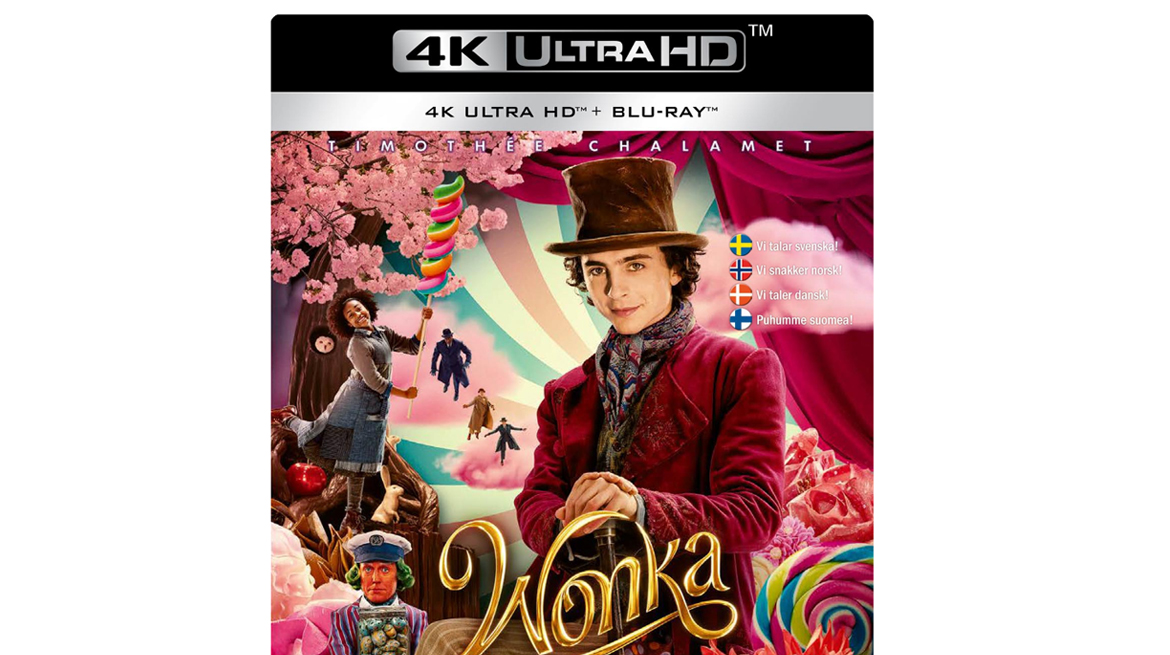TL;DR
Step into the magical, albeit challenging, early days of Willy Wonka before the chocolate empire! This origin story, brimming with vibrant colors and charming musical numbers, follows a young, idealistic Wonka as he navigates exploitation and finds friendship in unexpected places. While it masterfully captures the spirit of the classic film rather than Burton's take, and boasts stunning practical effects and an emotionally resonant story, Hugh Grant's fully CGI Oompa Loompa feels a bit uncanny. The UHD release offers a dazzling visual and aural feast, making it a delightful watch for all ages. Discover if this confectionary tale lives up to the hype and delve into the full review!
Wonka introduces us to the nascent years of the legendary chocolate maker Willy Wonka (Timothée Chalamet), long before he established his factory and initiated the Golden Ticket promotion. This original narrative, drawing inspiration from characters created by Roald Dahl, depicts a young Wonka arriving in the city with limited funds but ambitious aspirations and a profound knowledge of confectionery. He soon finds himself exploited by the unscrupulous Mrs. Scrubitt (Olivia Colman), forced into indentured servitude under false pretenses. However, this situation leads him to encounter Noodle (Calah Lane), with whom he forges a partnership to achieve remarkable feats.
Directed and co-written by Paul King (Paddington films), Wonka intentionally avoids being a direct prequel to Tim Burton’s Charlie and the Chocolate Factory (2005), sharing more thematic and stylistic similarities with the 1971 classic, Willy Wonka and the Chocolate Factory. This includes direct musical quotations and analogous scenes, such as Willy consuming a coffee cup crafted from candy. The Oompa Loompas also echo their appearance from the earlier film, which is discussed further below.
Wonka is a musical production. While the score is competently composed, it lacks truly memorable melodies that linger in the mind. The film boasts high production values, with a palpable sense of practical set design rather than an over-reliance on CGI. The narrative also possesses a compelling emotional core, adding significant depth. Timothée Chalamet delivers a strong performance as the youthful, idealistic Wonka, whose faith in humanity faces a harsh reality check. It’s plausible to envision this character evolving into the more cynical and eccentric figure familiar to audiences.
A significant drawback, however, is Hugh Grant’s portrayal of an Oompa Loompa. Instead of utilizing practical effects or makeup on a live actor, the filmmakers opted for a fully CGI-rendered character. There are instances where a disconnect is apparent between Grant’s performance and the animation, creating an uncanny effect. While Grant’s acting is commendable, the CGI body ultimately detracts from the overall viewing experience.
The UHD presentation of Wonka provides a visually and aurally rich experience. The image is presented in 2160p with HDR and a 2.39:1 aspect ratio. The image exhibits exceptional sharpness, allowing the vibrant confectionery to shine without visual artifacts or compression issues. The high bitrate ensures image stability, even during rapid camera movements. The Dolby Atmos sound design is equally impressive, featuring deep bass and pristine clarity in the musical numbers, complemented by engaging surround effects that enhance the sense of immersion.
The UHD edition includes a comprehensive suite of supplementary materials detailing various aspects of the film’s production, offering insightful behind-the-scenes perspectives.
In conclusion, Wonka on UHD is a recommended viewing experience, providing engaging entertainment for audiences of all ages. While a Swedish dubbed version is available on the disc (in Dolby 5.1), I would personally opt for the original audio track.
SF Studios provided review copies for the purpose of this evaluation. The provision of materials does not influence our editorial independence. Our reviews are conducted objectively, with our readers and consumers as our primary focus.

